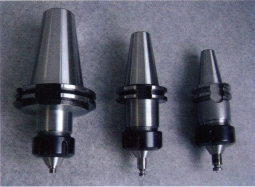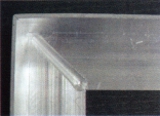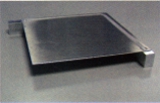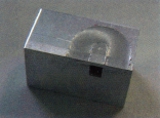New Tool Attachment a Revolution in Friction Stir Welding
The welding of aluminium sheet using conventional MIG, WIG or laser welding technologies requires expensive equipment as well as specialized training and certification. Even with the appropriate qualifications, traditional welding techniques present special challenges because of aluminium's proclivity to shrink by roughly 6% while transitioning from the liquid to solid phase during the welding process. In an attempt to counter the cost and technical challenges, many leaders in the aviation, marine and automotive industries have switched to an innovative technology for joining aluminium parts called friction stir welding.
Readers who follow INI's coverage of welding technology will already be familiar with friction stir welding. First patented in England in 1991, FSW is solid-state joining process in which no aluminium is actually melted during the joining process. This makes FSW perfect for many aluminium-related applications in which the metal's original characteristics must remain largely unchanged.
The FSW process uses a special cylindrical-shouldered tool called a pin. The rotating pin and shoulder are pressed against the work pieces to be joined, creating friction heat and thus causing the aluminium to soften. The pin at the tool tip stirs the softened material, creating a weld between the two work pieces.
Because the aluminium only softens but never melts, FSW is a true solid-state process with many advantages over conventional fusion welding processes like MIG, WIG or laser welding. It avoids problems such as porosity, solute redistribution, and solidification and liquation cracking. Materials joined with FSW are generally more finely grained and harder than before the joining process.
If there is a downside to FSW, says Norbert Meyer, CEO of Germany's IWE GmbH, it's price. The special machinery required to generate the constant pressure during pin rotation is expensive, starting at about 250 thousand Euros and ranging as high as 10 million Euros for more complex implementations. As a result, FSW is a technology that until now has remained an Option only for the largest companies.
IWE has changed die game with its introduction of a patented FSW tool attachment that turns virtually any milling machine into an FSW machining center. The process is as simple as it is sublime: insert the coneshaped tool attachment into the milling machine, clamp the workpiece appropriately, input preset parameters and weld away. Our photo block shows IWE's main toolset, which included Standard SK 30, SK 40 and SK 50 attachments.

IWE's main toolset: SK 30, SK 40 and SK 50.



According to Norbert Meyer, the attachments shown can be used to create butt and overlap welds ranging from 0.5 mm to 2.5 mm (in increments of 0.5 mm). For each type of weld, IWE supplies an appropriate pin that fits the tool attachments shown. Special designs for non-standard milling machines are available on request and a second tool set for thicker aluminium sheets (3 to 20 mm) is under development. Contact IWE for additional details about this second tool set.
Our other photos in the far left column of this article show examples of FSW welds created with the
help of IWE's tool attachment.
From top to bottom, these include a corner weld, aluminium sheet welded to a massive frame,
and closed cooling, heating and Ventilation ducts.
More Information about IWE's FSW tool attachment is available to readers of TNI on request. Please contact:
GF IWE GmbH & Co. KG
An der Thronpost 8
D-17489 Greifswald
Tel. (+49) 3834 514403
Fax (+49) 3834 514405
info@iwe-greifswald.de
www.iwe-greifswald.de
www.rrs-shop.de

